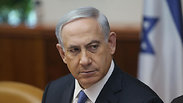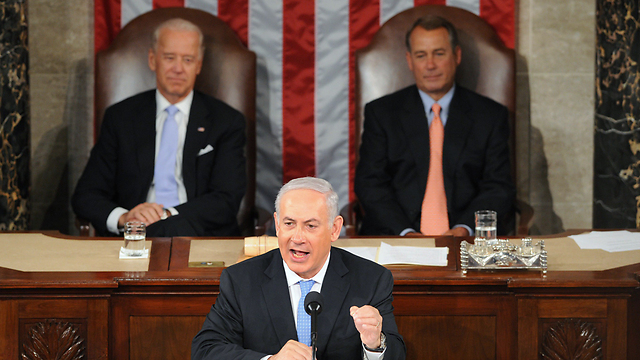
Netanyahu needs some damage control, and fast
Op-ed: If the prime minister is so insistent that the timing of his Congress speech has nothing to do with the elections, he should have no problem delaying it.
Benjamin Netanyahu's decision to address a joint session of Congress on the subject of the Iranian nuclear talks is a serious error of judgment.
Not only has it caused a further deterioration in his already shaky relationship with Barack Obama, but it has also led to a rift between Israel and the Democratic Party; embarrassment for the American Jewish community, most of whom are members and supporters of the Democratic Party; a severe blow to the Israeli lobby in Washington, which relies on bipartisan support and the Jewish community and the undermining of the status of Israeli Ambassador Ron Dermer.
It also has the potential for a tougher stance on the part of Iran, which is watching - open-mouthed - as Israel slides in status in the White House and Congress. Insisting on adhering to the original itinerary is another mistake. There are ways to minimize the damage, and Netanyahu needs to adopt one of them.
Netanyahu was counting on widespread support from both the Republicans and the Democrats for his position, which calls for tougher sanctions against Iran. And although Obama declared that he would veto the sanctions if Congress approved them, Netanyahu believed he could enlist the support of 67 senators from both US parties – the majority required to overturn a presidential veto.
He was wrong, and encountered just the opposite. The moment the planned address turned into a political and partisan issue between Obama and the Republican Congress, and between the Republican and the Democratic congressional leaders, its efficacy, already in doubt, dissipated.
Netanyahu, Knesset Speaker Yuli Edelstein and Ambassador Dermer tried last week to prevent the Democrats' desertion, but to no avail. The Democrats, and the Jewish delegates in particular, voiced harsh criticism of the entire process, and advised Netanyahu to forgo his address to Congress.
Obama, so it appears, is leading the way to a terrible agreement with Iran – so believe elements within the Obama administration, many members of Congress from both parties, and governments in Europe. The European position, which is more practical and effective than Congress' political viewpoint, is also putting pressure on Obama. Thus, the talks with Iran have little chance of coming to a conclusion by the end of March, according to International Atomic Energy Agency Director-General Yukiya Amano.
The principal supporters of harsher sanctions from both parties in Congress have announced they will discuss the issue only towards the end of March, so Netanyahu's Washington trip is not a matter of urgency, and appears to be only an election ploy to the accompaniment of meetings with Republicans in an effort to undermine Obama.
Netanyahu has four options – to cancel the trip and the address; to cancel the address but to travel to Washington and meet in person with congressional leaders and senior delegates, as suggested by Jewish Democrats; to ask Isaac Herzog join him; or to postpone the trip and the address until after the Israeli election. Every one of these options is better than the existing one.
An address to Republicans and a handful of embarrassed Democrats, with Senate leader Vice-President Joe Biden and the Democratic leaders in both houses absent, will cause further damage to the Iran issue and Israel-US relations.
Since Netanyahu claims that there is no link between the election in Israel and the timing of the address, and if Congress is scheduled to discuss new sanctions only at the end of March, the best option is to cancel the address entirely, or at least postpone it until after the Israeli election.
Prof. Eytan Gilboa is the director of the Center for International Communication at Bar-Ilan University and a senior research fellow at the Begin-Sadat Center for Strategic Studies.











